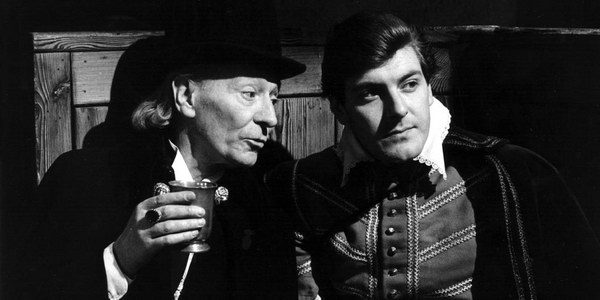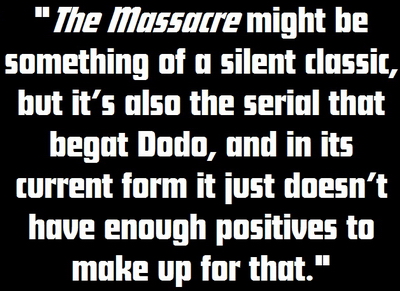|
| ||
|
PRODUCTION CODE W
WRITTEN BY JOHN LUCAROTTI & DONALD TOSH
DIRECTED BY PADDY RUSSELL
RATINGS 6.4 MILLION
WORKING TITLES THE WAR OF GOD & THE MASSACRE OF ST. BARTHOLOMEW'S EVE
RECOMMENDED PURCHASE 'THE MASSACRE' AUDIO CD (ISBN 0-563-55256-5) RELEASED IN AUGUST 1999.
BLURB The TARDIS lands in Paris on 19TH August 1572 and the Doctor, leaves Steven in order to MEET AND EXCHANGE VIEWS WITH THE apothecary Charles Preslin. Before he disappears, he warns Steven to stay out of "mischief, religion and politics."
IGNORING THE DOCTOR'S warniNG, STEVEN FINDS HIMSELF CAUGHT UP WITH A GROUP OF Huguenots. As HE tries to find his way bacK to the TARDIS, HE IS horrified to find that THE GREATEST PERSECUTOR OF THE HUGUENOTS IS ACTUALLY NONE OTHER THAN THE DOCTOR HIMSELF...
BBC ARCHIVE ALL FOUR EPISODES ARE MISSING. |
| |
|
|
| |
|
The Massacre 5TH FEBRUARY 1966 - 26TH FEBRUARY 1966 (4 EPISODES)
1. WAR OF GOD 2. THE SEA BEGGAR
3. PRIEST OF DEATH 4. BELL OF DOOM
I always wondered why The Massacre was chosen to launch the BBC Radio Collection’s range of surviving soundtracks. Completely dependent on the purely visual ploy of the Doctor and the Abbot of Amboise being almost physically identical, it doesn’t seem an obvious choice. Then again, few serials are quite as lost as The Massacre is – it is currently one of just three serials that we can only enjoy through sound and sound alone. Not a single second of footage survived the fires.
John Lucarotti and Donald Tosh’s script tells an interesting tale set around a historical event that many people - myself included - know precious little about. The format of the serial is similarly refreshing as for most of the story we do not see the Doctor at all; the tale is told instead from the viewpoint of his companion, Steven. It seems fitting, then, that after doing such a sterling job of carrying the narrative single-handedly the first time around, Peter Purves returns here to provide the linking narration. It is through Steven’s dialogue and Purves’s narration that we learn that the Abbot is the Doctor’s double, but like Steven we have no idea whether the Doctor has disguised himself the Abbot or has a doppelganger. Needless to say, on television this would have been a tantalising gimmick, and thanks to Purves’s quite excellent narration it can at least be understood and followed in this medium.
I can’t credit the BBC enough for taking the time and care not only
to dust down this lost soundtrack, but to make it palatable through
linking narration. Unfortunately though, unlike premeditated audio drama,
there is simply not enough here to give the real flavour of the piece. On
the strength of what survives, The Massacre might be something of a
silent classic, but it’s also the serial that begat Dodo, and in its
current form it just doesn’t have enough positives to make up for that.
|
||
|
Copyright © E.G. Wolverson 2006
E.G. Wolverson has asserted his right under the Copyright, Design and Patents Act 1988, to be identified as the author of this work. |
||
|
Unless otherwise stated, all images on this site are copyrighted to the BBC and are used solely for promotional purposes. ‘Doctor Who’ is copyright © by the BBC. No copyright infringement is intended. |
||

.jpg)
.jpg)

 The final episode of the serial is the most powerful of the four by
far.
The final episode of the serial is the most powerful of the four by
far.